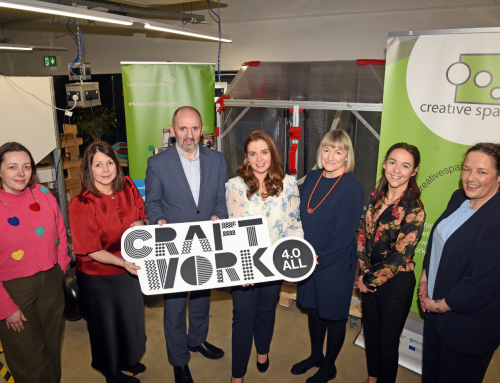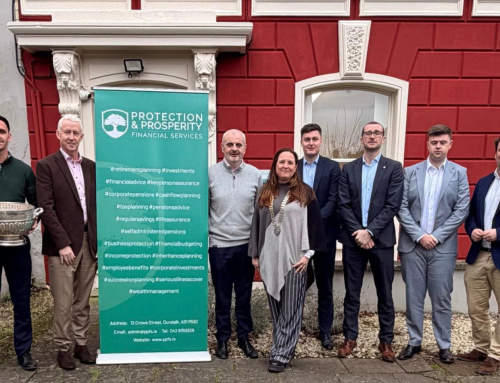The 2025 All-Island Industry 4.0 Future Skills Report launched at LMETB’s Advanced Manufacturing Training Centre of Excellence (AMTCE) in Dundalk on 12 June 2025 revealed that the advanced manufacturing sector is facing a growing skills challenge that threatens to impact innovation, competitiveness and economic growth unless coordinated action is taken.
The Future Skills Report was compiled on behalf of LMETB:AMTCE, Irish Manufacturing Research and the Advanced Manufacturing Innovation Centre (AMIC) at Queen’s University in Belfast with funding from InterTradeIreland.
In a significant move towards promoting high level advanced manufacturing skills and apprenticeship training across the Island of Ireland, the report launch was attended by Marian Harkin TD, Minister of State for Further Education at the Department of Further and Higher Education, Research, Innovation & Science (DFHERIS) and Dr Caoimhe Archibald, MLA, Minister for the Economy of Northern Ireland.
It was an inaugural visit for both Ministers to the world class facility, emphasising the AMTCE’s pivotal role in the integration of advanced skills training on an All-Island basis. Since its establishment in 2021, it has received significant investment from DFHERIS, Solas and Enterprise Ireland and has catered for 7,000 learners to date.
The Ministers were welcomed by Martin O’Brien, CE of LMETB, Sam Turner, CEO, AMIC-Queen’s University; Liz Carroll, Interim Learning and Development Director, Irish Manufacturing Research, Sadie Ward McDermott, Director FET at LMETB, Gerard Smith, Director of AMTCE and Joanne McEvoy, Project Manager, Innovation Programmes at InterTradeIreland.
Minister Marian Harkin said “The report clearly shows that the capacity to maintain and expand competitive manufacturing on the island will be determined by our ability to skill, upskill and re-skill. Cooperation between Governments, industry and academia has already demonstrated that by pooling our expertise and resources we can achieve a lot. The emergence of a broad spectrum of opportunities from micro qualifications to apprenticeships reflects the value of this partnership approach.”
Minister Caoimhe Archibald said: “I welcome this report and am grateful to all the partners involved in preparing it. Advanced manufacturing is a key priority area for the north’s economy. My Department has a dedicated action plan for the sector and through the City and Growth Deals we are investing heavily, not least with the establishment of the Advanced Manufacturing Innovation Centre at Queen’s University Belfast. In parallel, I recognise the need for a pipeline of talented people who have the skills to enable the sector to further grow and flourish. And we must continue to work together on an all-island basis. The mutual sharing of knowledge and expertise serves to benefit both the institutions and the individuals involved and strengthens the sector as a whole.”
The Report findings highlight persistent and widening gaps in critical areas such as robotics, automation, AI, and process design. Despite strong demand, education and training systems are struggling to keep pace with rapid technological change, while industry continues to face difficulties attracting new talent, especially from underrepresented groups.
Martin O’Brien, CE of LMETB said, “This is not just a workforce issue, it’s a competitiveness issue. If we want to lead in sustainable and advanced manufacturing, we must act now and together. The Report is an urgent call to governments, national agencies, education providers, and industry leaders to collaborate across borders and across sectors to futureproof our manufacturing workforce.”
Sam Turner, CEO, AMIC- Queen’s University reflected “The time is now to collaborate on the delivery of an appropriately skilled workforce across the Island of Ireland to drive efficiency and innovation and ensure that companies can adapt quickly to changing market demands and remain globally competitive. As rapid technological change is shortening the shelf-life of skills, the importance of collaborative reskilling and upskilling initiatives is key. AMIC is delighted to support and collaborate with our partners to future-proof manufacturing and increase inward investment through high value manufacturing innovation clusters.”
Barry Kennedy, CEO, Irish Manufacturing Research said, “Irish Manufacturing Research looks forward to working collaboratively to ensure that Ireland remains not just competitive, but a global leader in advanced manufacturing. We will continue to develop our curriculum offering working with AMTCE to ensure that we are providing leading edge training solutions in industry 4/5 that are required to keep our manufacturing sector competitive at a global level.”
Advanced manufacturing is a key industry on the Island of Ireland, with over 350,000 people employed, 260,000 (12% of total employment) and 90,000 in Northern Ireland (11%). It is at the forefront of industry 4.0, referring to the “smart” and connected systems that are designed to support production in real-time, increasing productivity, efficiency, and sustainability.
Key Findings:
- Skills Gaps Are Growing: Demand for advanced technical and transferable skills is rising, but training and curricula lag behind. Engagement from younger demographics, especially women, is still low. Young women are three times less likely to consider a career in advanced manufacturing than young men due to negative perceptions, lack of awareness of the opportunities and benefits of working in advanced manufacturing.
- Recruitment Is Struggling: Negative perceptions and a lack of visibility into career pathways are hindering talent pipelines.
- The System Is Fragmented: There is no coordinated all-island strategy, resulting in duplicated efforts, training misalignment, and limited cross-border collaboration.
- Industry and Education Are Out of Sync: Employers report difficulty accessing fit-for-purpose training, while educators struggle to respond to evolving industry needs quickly enough.
To build a resilient, inclusive, and future-ready manufacturing workforce, the 2025 Future Skills Report calls on governments, national agencies, education bodies, and industry leaders to act together:
For Government and Policymakers:
- Establish a joint All-Island Skills Taskforce to coordinate workforce planning and policy across both jurisdictions.
- Fund cross-border apprenticeships with mutual recognition of qualifications, especially in Robotics and Automation.
- Invest in real-time labour market data systems to dynamically respond to shifting skill needs.
For Education and Training Bodies:
- Accelerate curriculum development through an All-Island Curriculum Development Unit focused on advanced manufacturing.
- Expand micro-credential offerings in smart manufacturing and digital skills.
- Engage earlier with students through school pathways and industry exposure programmes—especially those aimed at women and underserved communities.
For Industry:
- Partner more actively with educators to shape course content and offer work-based learning.
- Support national campaigns to modernise perceptions of manufacturing and highlight real career opportunities.
- Share training resources and facilities to reduce duplication and expand access.
The 2025 Future Skills Report sets a strategic goal to build an inclusive, technologically responsive, and collaborative manufacturing workforce. It emphasises that success will depend on breaking down silos, modernising education systems, and fostering cross-border cooperation.
Link to Report here – https://amtce.ie/the-launch-of-the-all-island-industry-4-0-future-skills-report-at-the-amtce/
ENDS
Media queries, copies of the Report and interviews, please contact
Barbara Elliott, Touchstone Communications. barbara@tstone.ie 087-2933580






